新人教版高中英语Travelling around Listening and Talking
- 格式:pptx
- 大小:1.93 MB
- 文档页数:22
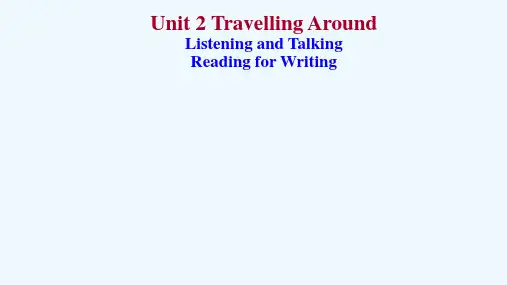
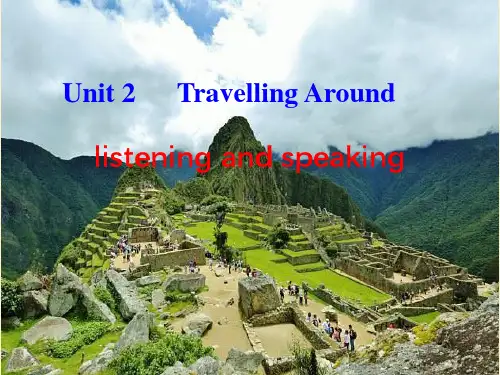
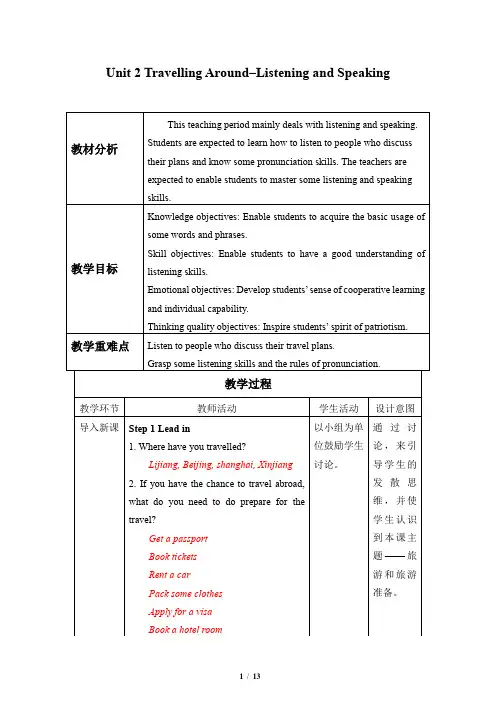
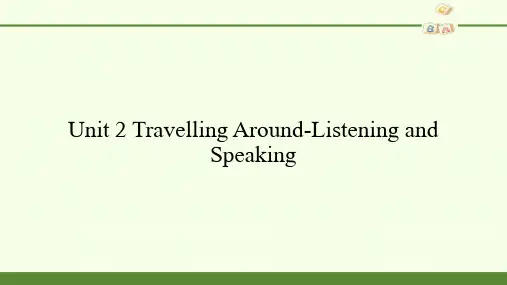
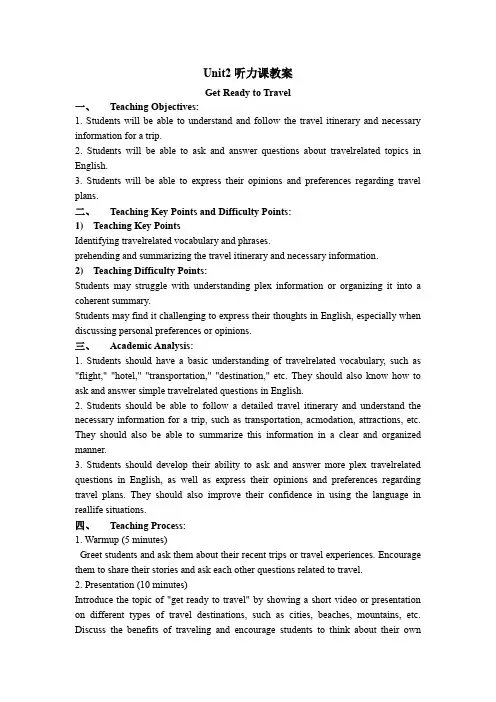
Unit2听力课教案Get Ready to Travel一、Teaching Objectives:1. Students will be able to understand and follow the travel itinerary and necessary information for a trip.2. Students will be able to ask and answer questions about travelrelated topics in English.3. Students will be able to express their opinions and preferences regarding travel plans.二、Teaching Key Points and Difficulty Points:1)Teaching Key PointsIdentifying travelrelated vocabulary and phrases.prehending and summarizing the travel itinerary and necessary information.2)Teaching Difficulty Points:Students may struggle with understanding plex information or organizing it into a coherent summary.Students may find it challenging to express their thoughts in English, especially when discussing personal preferences or opinions.三、Academic Analysis:1. Students should have a basic understanding of travelrelated vocabulary, such as "flight," "hotel," "transportation," "destination," etc. They should also know how to ask and answer simple travelrelated questions in English.2. Students should be able to follow a detailed travel itinerary and understand the necessary information for a trip, such as transportation, acmodation, attractions, etc. They should also be able to summarize this information in a clear and organized manner.3. Students should develop their ability to ask and answer more plex travelrelated questions in English, as well as express their opinions and preferences regarding travel plans. They should also improve their confidence in using the language in reallife situations.四、Teaching Process:1. Warmup (5 minutes)Greet students and ask them about their recent trips or travel experiences. Encourage them to share their stories and ask each other questions related to travel.2. Presentation (10 minutes)Introduce the topic of "get ready to travel" by showing a short video or presentation on different types of travel destinations, such as cities, beaches, mountains, etc. Discuss the benefits of traveling and encourage students to think about their owntravel dreams and plans.3. Practice (15 minutes)●Ask students to predict the main content of the conversation based on thequestions in activity2. Then listen to the first part of the material and choose the best answer.●Ask students to listen to the second part of material carefully and answerquestions in activity 3●Ask students listen to the whole conversation and then plete the table in materialfour.●Teachers and students check the answers together, and discuss the difficultiesencountered in the listening practice and solutions4. Production (15 minutes)Ask students to imagine they are planning a trip to a destination of their choice (e.g., Tokyo). In pairs or small groups, ask them to discuss their travel preferences, such as transportation mode, type of acmodation, mustvisit attractions, food, etc. Encourage them to ask each other questions and provide feedback on their ideas. After 10 minutes, ask each group to present their ideas to the class. Monitor and provide feedback on their work.5. Consolidation (5 minutes)Review the key points and difficulties of the lesson and emphasize the importance of practicing English skills for effective munication during travels. Encourage students to continue exploring travelrelated vocabulary and phrases outside of class and use them in daily conversations with friends or family who have traveled abroad.6. HomeworkAssign homework where students write a short essay or create a dialogue between two people planning a trip to a destination of their choice, incorporating all the key points discussed in the class. This exercise will help reinforce the concepts learned and improve their writing skills in English.。
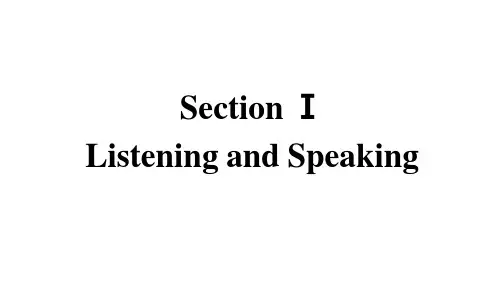
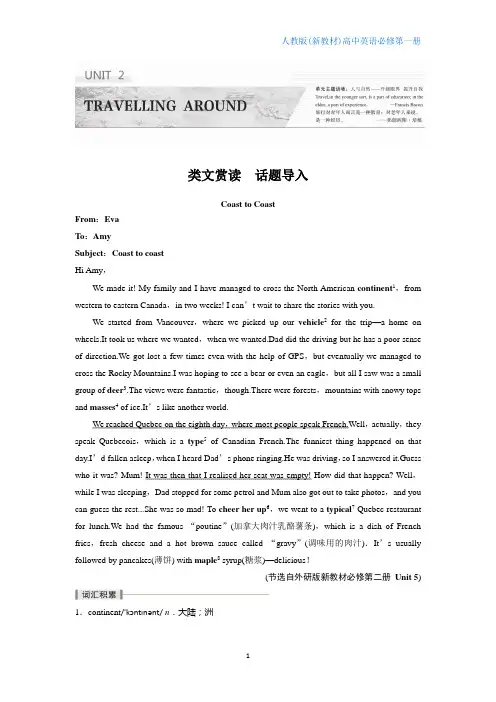
类文赏读话题导入Coast to CoastFrom:EvaTo:AmySubject:Coast to coastHi Amy,We made it! My family and I have managed to cross the North American continent1,from western to eastern Canada,in two weeks! I can’t wait to share the stories with you.We started from Vancouver,where we picked up our vehicle2for the trip—a home on wheels.It took us where we wanted,when we wanted.Dad did the driving but he has a poor sense of direction.We got lost a few times even with the help of GPS,but eventually we managed to cross the Rocky Mountains.I was hoping to see a bear or even an eagle,but all I saw was a small group of deer3.The views were fantastic,though.There were forests,mountains with snowy tops and masses4 of ice.It’s like another world.We reached Quebec on the eighth day,where most people speak French.Well,actually,they speak Quebecois,which is a type5of Canadian French.The funniest thing happened on that day.I’d fallen asleep,when I heard Dad’s phone ringing.He was driving,so I answered it.Guess who it was? Mum! It was then that I realised her seat was empty! How did that happen? Well,while I was sleeping,Dad stopped for some petrol and Mum also got out to take photos,and you can guess the rest...She was so mad! To cheer her up6,we went to a typical7 Quebec restaurant for lunch.We had the famous “poutine”(加拿大肉汁乳酪薯条),which is a dish of French fries,fresh cheese and a hot brown sauce called “gravy”(调味用的肉汁).It’s usually followed by pancakes(薄饼) with maple8 syrup(糖浆)—delicious!(节选自外研版新教材必修第二册Unit 5) 1.continent/'kɔntɪnənt/n.大陆;洲2.vehicle/'viːɪk(ə)l/n.车辆;交通工具3.deer/dɪə/n.鹿4.mass/mæs/n.大量,许多5.type/taɪp/n.类型;种类6.cheer sb.up使某人振作起来7.typical/'tɪpɪk(ə)l/adj.典型的8.maple/'meɪp(ə)l/n.枫树1.We reached Quebec on the eighth day,where most people speak French.我们在第八天到达了魁北克,那里大部分人说法语。
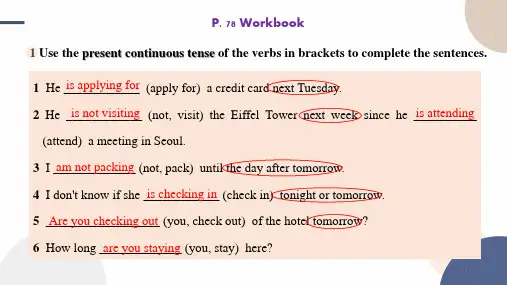
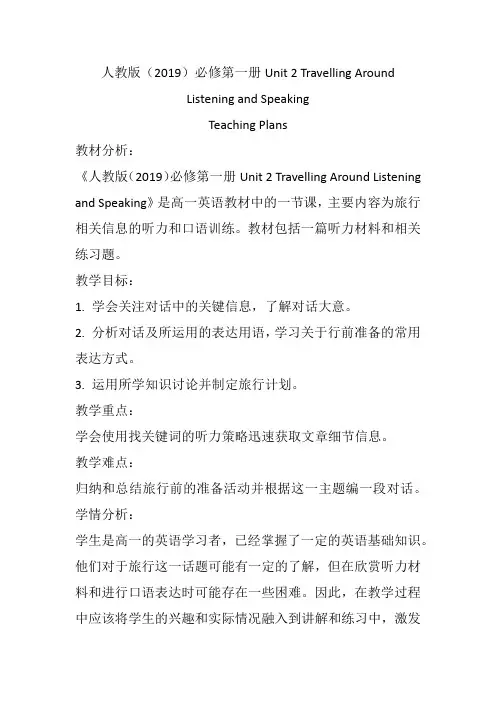
人教版(2019)必修第一册Unit 2 Travelling AroundListening and SpeakingTeaching Plans教材分析:《人教版(2019)必修第一册Unit 2 Travelling Around Listening and Speaking》是高一英语教材中的一节课,主要内容为旅行相关信息的听力和口语训练。
教材包括一篇听力材料和相关练习题。
教学目标:1. 学会关注对话中的关键信息,了解对话大意。
2. 分析对话及所运用的表达用语,学习关于行前准备的常用表达方式。
3. 运用所学知识讨论并制定旅行计划。
教学重点:学会使用找关键词的听力策略迅速获取文章细节信息。
教学难点:归纳和总结旅行前的准备活动并根据这一主题编一段对话。
学情分析:学生是高一的英语学习者,已经掌握了一定的英语基础知识。
他们对于旅行这一话题可能有一定的了解,但在欣赏听力材料和进行口语表达时可能存在一些困难。
因此,在教学过程中应该将学生的兴趣和实际情况融入到讲解和练习中,激发他们的学习热情。
教学策略:1. 创设情景:通过创造旅行准备的实际情境,激发学生的学习兴趣。
2. 合作学习:鼓励学生进行交流和合作,提高口语表达能力。
3. 多媒体辅助:使用多媒体工具呈现听力材料和相关图片,增加学生的视听体验。
教学方法:1. 情境导入法:通过问题或图片引入话题,激活学生的相关知识和经验。
2. 听力训练法:通过听力材料进行听力训练,培养学生获取关键信息的能力。
3. 对话练习法:设计针对旅行准备话题的对话练习,提高学生的口语表达能力。
4. 小组讨论法:组织学生在小组内进行讨论,共同制定旅行计划,培养合作和团队意识。
在教学过程中,可以采用以下步骤进行教学:1. 导入:通过问题或图片引入话题,激发学生的学习兴趣。
2. 听力训练:播放听力材料,明确学生任务,引导学生使用找关键词的听力策略迅速获取文章细节信息。
3. 分析对话及表达用语:引导学生分析对话内容并掌握常用的行前准备表达方式。
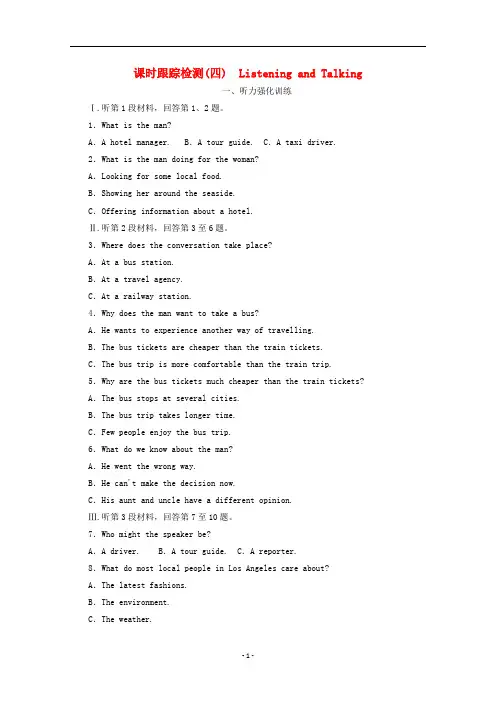
课时跟踪检测(四) Listening and Talking一、听力强化训练Ⅰ.听第1段材料,回答第1、2题。
1.What is the man?A.A hotel manager. B.A tour guide. C.A taxi driver. 2.What is the man doing for the woman?A.Looking for some local food.B.Showing her around the seaside.C.Offering information about a hotel.Ⅱ.听第2段材料,回答第3至6题。
3.Where does the conversation take place?A.At a bus station.B.At a travel agency.C.At a railway station.4.Why does the man want to take a bus?A.He wants to experience another way of travelling.B.The bus tickets are cheaper than the train tickets.C.The bus trip is more comfortable than the train trip.5.Why are the bus tickets much cheaper than the train tickets? A.The bus stops at several cities.B.The bus trip takes longer time.C.Few people enjoy the bus trip.6.What do we know about the man?A.He went the wrong way.B.He can't make the decision now.C.His aunt and uncle have a different opinion.Ⅲ.听第3段材料,回答第7至10题。
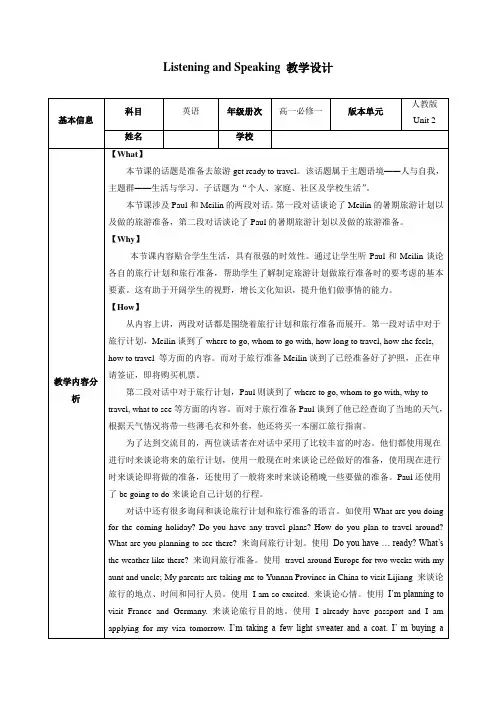
Listening and Speaking 教学设计人一组分享各自获取信息,再用完整句子在全班汇报Paul 的旅行计划。
例如第1题回答:Paul’s family is going to Yunnan Province over the holiday.4. 学生听数字教材第24页活动4音频,获取Paul和Meilin 旅行准备情况,填写教材第24页活动4的表格,之后2人一组分享各自获取信息,再用完整句子在全班汇报Meilin和Paul的旅行准备。
行计划有关的信息,引导学生使用现在进行时表将来。
帮助学生获取并谈论和Meilin和Paul的旅行准备有关的信息,引导学生使用现在进行时表将来。
获取与梳理2. 梳理如何做旅行计划和准备1. 学生第二遍听数字教材第24页活动4音频,在书上空白处补充Meilin和Paul旅行计划和旅行准备的信息。
•What else do we know about Meilin’s and Paul’s travelplans and travel preparations?2. 学生使用思维图梳理自己之前获取的信息,概括谈论旅行计划和旅行准备应该涵盖的方面。
之后2人一组分享所梳理的信息,根据自己的经验添加新的方面,最后全班分享。
•What should be included when we talk about our travelplans and travel preparations?期待学生做出包含如下信息的思维导图:围绕旅行准备这一主题,引导学生整合所获取的信息,总结谈论旅行计划和旅行准备时应涉及到的内容,为之后的说做准备。
概括与整合。
2019新人教必修1Unit2 Travelling around整单元教案教学设计单元内容分析:本单元围绕旅行这一主题展开, 内容涉及计划制订、旅行前的准备、景点介绍、旅游文明行为以及旅游业发展利弊的讨论等内容。
旅游不仅是欣赏风景, 还可以让人开阔视野、陶冶性情、锻炼身体、磨炼意志等, 是人生历练和学习的一部分。
本单元旨在引导学生了解中国和秘鲁等国家的著名景点和文化特色, 拓展学生Period1 Listening and speakingTeaching objectives:1.Enable students know how to get ready for a travel and grasp the tip of listening2.Develop students’ sense of cooperative learning and individual thinking capability.3.By the end of this period, students will be able to talk about the plans using“be doing”and know how to prepare for a travel.Teaching key points:1.Help the students to grasp the key words in the tape.2.Teach the students to use“be doing”to express their future plans.Teaching difficult points:1.Enable the students to use“be doing”to express their future plans2.Enable the students to talk freely using what they have learned in the listening text.Teaching methods● Task-based language teaching ● Audio Lingual Method● Communicative ApproachLearning methodsIndependent study, Cooperative learning and Inquiry-based learningTeaching procedures:Step1 Lead-inAsk students to look at the picture on P23 and discuss the following questions.T:What can you see in the picture?S:The picture is of a father and his son hiking in the mountain.T:Do you think the trip is good for us?S:Yes,,includin.reducin.stress.broadenin.o u.horizons,enric.ou.knowledg.and....Step2 Listening:Get ready to travelActivity1:Warming upBefore listening, show the four pictures to the students to arouse their interest.T:Do you want to go to the places?S:YesT:What do you need to do to prepare for the trip?S:We need to book tickets,hotel rooms, buy a guidebook, do some research about the places to visit,pack some clothes, get a passport ,apply for a visa....(students’ answers are various)Activity2:First ListeningListen to the first part of the conversation and finish Ex.2 on page24.Suggested answer:(1)AD (2)B (3)AAnd then listen to the second part of the conversation and finish Ex.3 on page 24. Suggested answer:(1)Lijiang in Yunnan, China.(2)One of his father’s friends lives there and he invited them to visit.Activity3:Second listeningListen to the whole conversation again and finish Ex4 on page24Activity4 Third ListeningListen to the whole conversation again and fill in the blanks below.(pay attention to the “be doing” structure)Conversation 1Paul:Hey,Meilin !So what are you doing for the coming holiday?Meilin:I am travelling around Europe for two weeks with my aunt and uncle.Paul:Europe?Oh,I'v.alway.wante.t.g.there.Meilin:Yes.Me,too.I’m so excited.I am planning to visit France and Germany. Paul: That's wonderful! Do you have your passport and visa already?Meilin:.alread.hav.m.passport,an..a.applyin.fo.m.vis.tomorrow.Onc..ge.th.visa.we'l.bo o.fligh.ticket.online.Paul:So how do you plan to travel around ?Meilin:We are renting a car and driving!My uncle has always wanted to drive around Europe!Conversation 2Meilin: So what about you,Paul?Do you have any travel plans?Paul:Yes,actually!My parents are taking me to Yunnan Province in China to visit Lijiang!····Meilin: Oh, that's nice! So what's the weather like there?Paul:It should be pleasant during the day,but it might be cold at night,so I am taking a few light sweaters and a coat.Meilin:What are you planning to see therePaul:Well,.kno.I'.definitel.goin.t.se.th.Ol.Tow.o.Lijian.an.Yulon.Sno.Mountain.Othe.tha.that.I’.no.sure..a.buyin..Lijian.guideboo.today.actually.Step3 Speaking(free talk)Choos..trave.destinatio.an.thin.abou.wha.yo.woul.d.t.prepar.t.trave.there.The.shar.yo u.trave.plan.wit.you.partner.(th.exampl.i.o.p25)Step4 HomeworkUse the “ be doing” structure to describe your weekend plan with your partner.Period2 Reading and ThinkingExplore PeruTeaching objectives:1.Students will be able to learn something about the tourist attractions in Peru and learn something about Peru in geography, history and culture.2.Figure out the purpose and main structure of the passage.3.Grasp and use some words and expressions describing a tourist attraction. Teaching key points:1.Explore and understand the basic information about Peru in geography,history and famous travel destinations.2.Help students identify the text type and its language features.3.Enable students grasp and use some words and phrases describing a tourist attraction.Teaching difficult points:1.Enable students to identify the text type and its language features and apply different approaches to deepen the understanding of the text and language use.2.Guide students to put the language features into use.Teaching methods● Task-based language teaching ● Communicative ApproachLearning methodsCooperative learning and Inquiry-based learningTeaching procedures:Step1 Lead-inAsk students a few questions.T:If you want to have a good trip to Peru, what information do you need to know? S:I would like to know the travelling routes and the destination spots.T:How can you know it?S:We can surf the Internet looking for information; we can also go to the travel agency to find out some travelling brochures to collect more information ......Step2 Scanning for the right text type.T: Boys and girls,please scan the two texts about Peru and tell me which text is a travelling brochure and why.S: Th.secon.tex.i..brochure.Becaus.th.titl.o.th.secon.tex.is “Trave.Peru”nguag.i.mor.vivid.W.ca.als.fin.th parison.th.firs.tex.i.a.encyclopedia.Step3Scanning for detailsActivity1 Read the first text and fill in the table.(红色为学生填写部分)Activity2 Read the second text and fill in the table.(红色为学生填写部分)Step4:Topic related lexis(词汇)Ask students to read the second text again and try to find out the following topic lexis:1.Words and phrases used for transportation:flight, by boat, walking, driving...2.Words and phrases used for activity:explore, enjoy, visit, admire...3.Words and phrases used for emotions or evaluation:enjoy, unique, amazed, amazing, perfect, admire, excellent, beautiful...4.Words and phrases used for destination spots:rainforest, plants and animals, ancient city, building, museum, food, architecture, island, water plants....5.Verbs used for both actions and emotions:enjoy, admireStep 5 Language use(team-work)T:Boy.an.girls.pleas.loo.a.th.fou.picture.o.P26-2.an.write1,2,3,.o.eac.piec.o.pape.t.sta n.fo.eac.o.th.picture.An.no.suppos.yo.ar..loca.guide.describ.th.on.t.you.partne.b.casti n.lots(抓阄)rmation(nam.o.th.place.time.activities. ..)nguage.Step6 Homework1.Review the whole text and find out all the imperative sentences in it.2.Find out more information about Peru and make a different travelling brochure.Period 3 Language Focus/PointsTeaching objectives:By the end of the period, students will be able to1.Master the usage of such important words and expressions as narrow,unique,other than, besides,contact etc;learn to express themselves by using them.2.Enjoy the fun of expressing themselves using English and participate in class with passion.Teaching key points:1.Help students to master the usage of important words, phrases and sentence patterns and check.2.Exercises are expected to assist students to express themselves freely in English. Teaching difficult points:1.How to use the words and phrases in real situations.Teaching methods● Task-based language teaching ● Communicative ApproachLearning methodsself-study&cooperative explorationTeaching procedures:Stpe1: Self-directed studyT:I.thi.clas.w.wil.lear.th.importan.word.an.expression.i.thi.unit.First.it’.sel.stud.time. ag.o.th.underli ne.word.o.phrase.b.referrin.t.th.dictionar.o.referenc.books.Mak..mar.wher.yo.can’. understand.Then,ter,we’l.se.wh.i.th.bes.self-learner.Pleas.begi.now.(15minutes)Step2:Presentation:T:Time is up.Let’s see how to learn the words , expressions and sentence patterns one by one.1.narrow①adj.狭窄的;勉强的;狭隘的The gate is too narrow for a car.门太窄了, 汽车进不去。
Unit 2 Travelling Around-Listening and Speaking &Listening and Talking【教学目标与核心素养】1. Instruct students to get main facts by listening and motivate them to talk about the topics about how to prepare for the trip and make reservations by listening and ultimately can make travel arrangements and reservations.2. Develop students’ sense of cooperative learning and individual thinking capability.3. Develop students’ different listening skills to solve different listening comprehensive problems.4. Help students to understand how to use the structures “the present continuous tense (be doing) is used to express future plans.【教学重难点】1. Teach students how to focus on key words, not on single words or grammar.2. Prompt Ss to talk about the related topics, such as how to prepare for the trip and make a travel plan.【教学过程】Step 1: Listening and SpeakingLead inThe teacher is advised to talk with their students about the places that they want to travel most both at home and abroad: boys and girls, if you have a chance to travel around the world, where will you go? After their small talk, the teacher can move on by finishing the following listening task:Before travelling, what do we need to prepare for the trip?After finishing the task above, the teacher is expected to play Conversation 1 which is about Paul and Meilin’s conversation about coming holiday and after finishing listening for the first time, the students need to solve the following task.1. Circle the two places Meilin is going to for holiday.A. Germany.B. England.C. Iceland.D. France.2. How is she going to get there?A. By sea.B. By air. C .By train.3 How is she planning to get around after she arrives?A .By car. B. By train. C. On foot.After finishing the task above, the teacher is expected to play Conversation 2 which is about where and why Paul is visiting with his family and after finishing listening, the students need to solve the following task.Listen to Conversation 2. Then answer the following questions:1. Where is Paul's family going over the holiday?2. Why are they going there?After finishing the task above, the teacher is expected to play Conversation 3 which contains the whole conversation and solve the following task.Finally, after finishing the task above, the teacher is expected to instruct students to work in groups to finish the following project:Speaking ProjectWork in pairs. Choose a travel destination and discuss how to prepare for the trip.PronunciationHave the Ss listen and repeat. Then try to add more words to each group.Then listen to the sentences below. Let the Ss notice the pronunciation of the letters in bold.Step 2: Listening and TalkingTeacher talks with their students about the related topic: Boys and girls, do you know how to make reservations for a trip? Let’s listen and find out:Play the listening and answer the following questions:1. What are the two speakers talking about?2. What is the relationship between the two speakers?Listen again and complete the table with the words you hear.Making reservationsTalking projectWork in groups.Imagine you are making plans for the holiday. Choose one of the situations below and role-play a phone call with a partner.活动目的:教育学生懂得“水”这一宝贵资源对于我们来说是极为珍贵的,每个人都要保护它,做到节约每一滴水,造福子孙万代。
人教高中英语必修一Unit2Listening and Speaking教学设计1.教学内容What:本课材料主题为“准备好去旅行”(Get ready to travel)。
听力文本由两段对话构成。
第一段对话中Meilin向Paul介绍自己的叔叔与婶婶要去欧洲自由行的计划,谈到目的地国家、出行方式、以及出国旅行的必要准备工作。
第二段对话中Paul向Meilin 介绍自己与父母去云南丽江旅行的计划,谈到了去丽江的原因、当地天气、计划参观的景点,以及准备的衣物等。
Why: 学生通过听两段对话了解旅行前要做哪些准备,最终能与同伴分享自己的旅行计划。
此外该板块选取了国内和国外不同景点,既能增强学生爱国情怀,又能开阔学生的国际视野。
How: 活动1是听前活动,激活学生关于旅行的相关背景知识,列出的八个短语是精选出的有关行前准备的常用搭配,学生在语境中学习并体会这些短语,以备口语输出之用。
活动2-4是听力活动,检测学生捕捉细节信息与获取主旨大意的能力,同时渗透听关键词的策略。
活动5是听后的口语表达,与同伴分享自己的旅行计划和行前准备,培养其制定计划的能力和语言表达的能力。
2.学情分析高一学生英语听力在初中已有一定经验,具备一定能力,但在具体听的微技能上缺乏系统训练,听的有效性有待进一步提高,此外由于中考没有口语考查,因此口头表达相对较弱。
但是处于青少年期的学生,思维活跃,活泼好动,喜欢交流和表达,好奇心强,乐于接受新鲜事物,相信通过系统练习,学生的听说能力会逐步提高。
3.课时目标(1)在语境中学习理解词块并能简单应用。
(2)通过听力练习,能抓住关键词,理解听力文本大意。
(3)使用本单元所学词汇和结构表达将来的计划,并能与同伴分享旅行计划。
(4)了解一些有关旅行前要准备的东西,形成制定计划时全面考虑、系统安排的意识。
4.教学重点难点听出关键词并根据关键词抓住材料的主旨大意;掌握有关行前准备的常用表达。
5.教学过程6.板书设计。
Travelling AroundListening and SpeakingListening Part1Paul: Hey , Meilin! so what are you doing for the coming holiday?Meilin :I’m travelling around Europe for two weeks with my aunt and uncle。
Paul: Europe? oh I have always wanted to go there! Meilin :yes me too。
I am so excited. I am planning to visit France and Germany.Paul: That’s wonderful! Do you have your passport and Visa already?Meilin :I already have my passport。
And I am applying for my Visa tomorrow. Once I get the Visa ,we will book flight tickets online。
Paul: So how do you plan to travel around.Meilin :we are renting a car and driving! My uncle has always wanted to drive around Europe。
Listening Part2Meilin :So what about you, Paul ?Do you have any travel plans?Paul:Yes , Actually! My parents are taking me to Yunnanprovince in China to visit Lijiang。